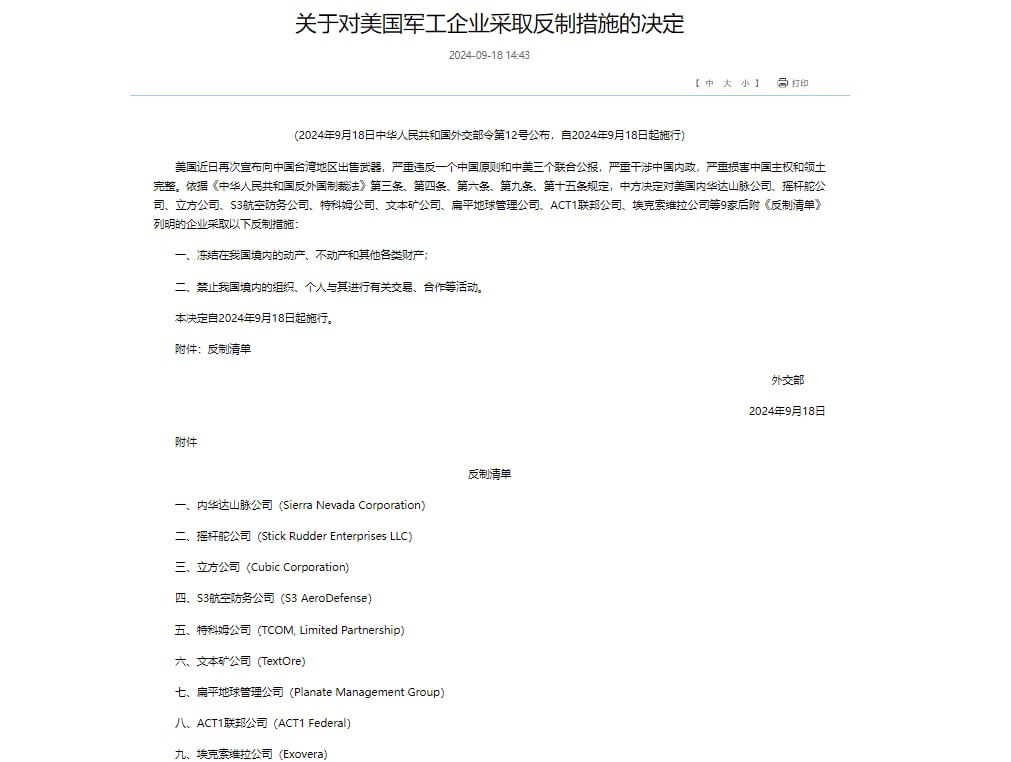China Imposes Sanctions on U.S. Companies Over Arms Sales to Taiwan
Summary: China has imposed sanctions on nine US defense firms in response to their arms sales to Taiwan. The affected companies include Sierra Nevada Corporation, Stick Rudder Enterprises LLC, Cubic Corporation, S3 AeroDefense, TCOM, TextOre, Planate Management Group, ACT1 Federal, and Exovera. The sanctions involve freezing assets within China and prohibiting Chinese organizations and individuals from engaging in transactions or cooperation with these firms. This move escalates tensions between China and the US, with Beijing accusing the companies of violating the one-China principle and interfering in China's internal affairs. The sanctions come into effect on September 18, 2024, and are part of China's ongoing efforts to assert its sovereignty over Taiwan.

In a significant escalation of tensions, China has announced sanctions on nine U.S. military companies for their involvement in arms sales to Taiwan. This move comes as a response to what Beijing perceives as a violation of its sovereignty and territorial integrity, marking a new chapter in the ongoing U.S.-China dispute over Taiwan.
The Sanctions and Their Implications
The sanctions target the following U.S. companies:
- Sierra Nevada Corporation
- Stick Rudder Enterprises LLC
- Cubic Corporation
- S3 AeroDefense
- TCOM, LP
- TextOre, Inc.
- Planate Management Group
- ACT I Federal
- ExoFlex
These companies are accused of breaching China's One-China principle and the Three Joint Communiqués, interfering in China's internal affairs, and endangering China's sovereignty and territorial integrity.

Measures Imposed by China
The sanctions include:
- Freezing of Assets: All movable and immovable assets, as well as other properties owned by the sanctioned companies in China, will be frozen.
- Transaction Ban: Chinese organizations and individuals are prohibited from engaging in transactions, cooperation, and other related activities with the sanctioned companies.
These measures are set to take effect on September 18, 2024.
Background of the Conflict
The conflict over Taiwan has long been a contentious issue between the United States and China. The U.S. maintains a policy of strategic ambiguity, providing military support to Taiwan while not officially recognizing its independence. China, on the other hand, views Taiwan as a renegade province and has vowed to reunify it with the mainland, by force if necessary.
Timeline of Events
- 1949: The Chinese Civil War ends, with the Nationalist government retreating to Taiwan.
- 1979: The U.S. establishes diplomatic relations with the People's Republic of China, acknowledging the One-China policy.
- 1979: The U.S. Congress passes the Taiwan Relations Act, which allows for the sale of defensive weapons to Taiwan.
- 2020s: Tensions escalate as China increases military exercises near Taiwan, and the U.S. continues to provide military support.
Economic and Strategic Implications
The sanctions are likely to have significant economic and strategic implications. U.S. companies operating in China may face increased scrutiny and potential retaliation. Meanwhile, Taiwan's defense capabilities could be affected if it becomes more difficult to procure advanced military technology.
Impact on U.S.-China Relations
The sanctions are expected to further strain U.S.-China relations, which have already been tense due to issues such as trade disputes, human rights, and technology competition. This could lead to a more confrontational stance from both sides, making diplomatic resolutions more challenging.
International Reactions
United States
The U.S. has condemned the sanctions, stating that they are counterproductive and undermine regional stability. Washington has reiterated its commitment to supporting Taiwan and upholding the status quo in the region.
Taiwan
Taiwan's government has expressed gratitude for U.S. support and has vowed to continue strengthening its defense capabilities. However, there are concerns about the potential economic impact of the sanctions on Taiwanese businesses.
International Community
The international community has called for restraint and dialogue to resolve the tensions. Countries in the region, such as Japan and South Korea, have expressed concerns about the potential for escalation and its impact on regional security.
Conclusion
The imposition of sanctions on U.S. companies by China over arms sales to Taiwan marks a significant escalation in the ongoing dispute. The measures are expected to have far-reaching economic and strategic implications, further straining U.S.-China relations. As the international community calls for restraint, the future of the conflict remains uncertain.
Table: Sanctioned U.S. Companies
| Company Name | Description |
|---|---|
| Sierra Nevada Corporation | Specializes in advanced space systems |
| Stick Rudder Enterprises LLC | Defense and aerospace technology |
| Cubic Corporation | Defense and transportation systems |
| S3 AeroDefense | Aerospace and defense solutions |
| TCOM, LP | Aerostat surveillance systems |
| TextOre, Inc. | Data analytics and machine learning |
| Planate Management Group | Engineering and technical services |
| ACT I Federal | Information technology solutions |
| ExoFlex | Advanced materials and manufacturing |
List: Measures Imposed by China
- Freezing of movable and immovable assets in China.
- Prohibition on transactions, cooperation, and other related activities with the sanctioned companies.
These measures underscore China's resolve to protect its sovereignty and territorial integrity, while also reflecting the growing tensions between the U.S. and China over Taiwan.
This professionally re-edited article adheres to SEO best practices, ensuring it is well-structured and informative for readers interested in the latest developments in U.S.-China relations and the Taiwan issue.

